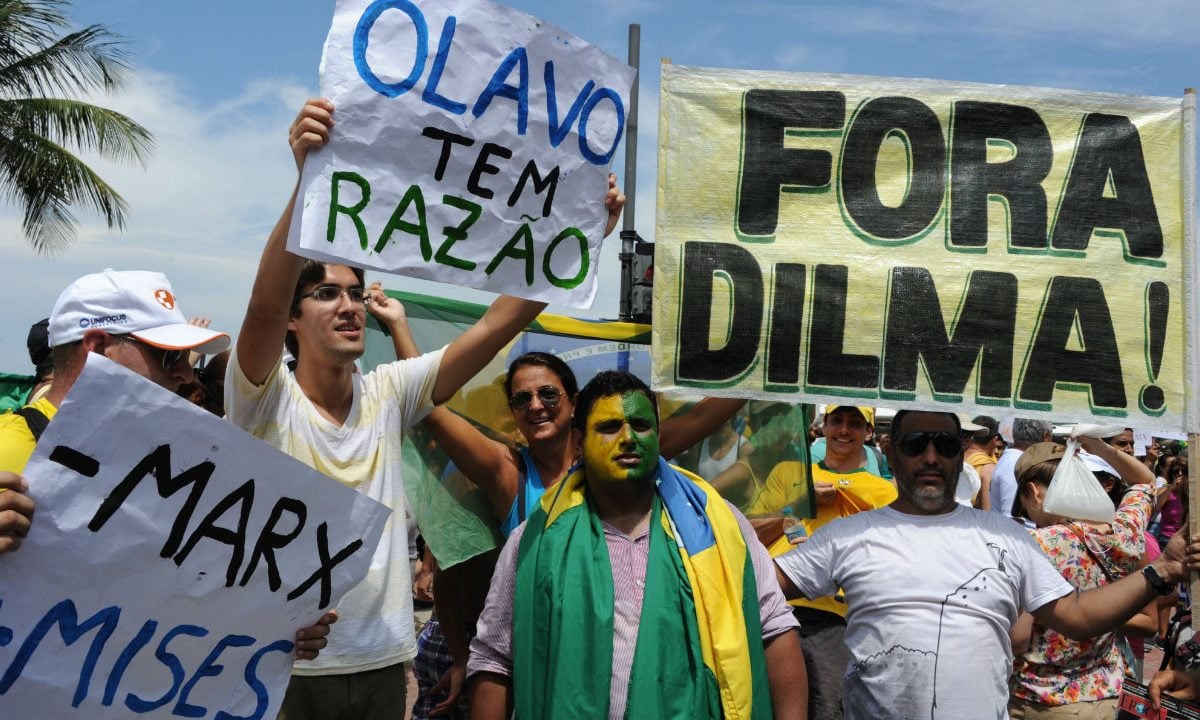Glenn Greenwald
The Original Sin
Dilma’s impeachment brought Brazil to this situation. And it all occurred with the goodwill of the media

My debut column in Carta Capital, a magazine I have read religiously since moving to Brazil in 2005, is an excellent opportunity to explain my journey in Brazilian journalism and what it taught me about the role of the press. That journey is inextricably tied to a historic injustice — the 2016 impeachment of former President Dilma Rousseff — whose significance has been overshadowed, sometimes forgotten, as a result of subsequent events.
For the first ten years that I lived in Brazil, I avoided commenting on domestic Brazilian politics. Even as my husband, now-Deputado David Miranda (PSOL-RJ), became increasingly involved in political activism, my own journalism focused on issues such as civil liberties assaults in the U.S. and Europe, attacks on the rights of Muslims, and imperialism in the Middle East. Even when I was very visible in the Brazilian media while doing reporting on the Snowden documents in 2013 and 2014 — with Fantástico and O Globo — I would typically refuse to provide my views about domestic politics in Brazil when asked.
That avoidance was based on a humility that it is extremely difficult to learn the nuances and undercurrents of the politics of a country in which you did not grow up. Despite reading ample political news (including this magazine) and being immersed in my husband’s burgeoning political work, I did not feel qualified — even after a decade living here — to analyze or report on Brazil’s domestic politics (it always amazes me to see people opine so didactically on the domestic politics of a country in which they never lived, including the U.S.).
All that changed in 2016. The first time I ever used my platform to insinuate myself into a domestic controversy was when then-Judge Sergio Moro manipulatively caused the leak of private conversations between then-President Dilma and former President Lula da Silva. At the time, I did not know everything about Moro’s misconduct in this case that I know now thanks to #VazaJato — that he violated his own protocols and illegally recorded Dilma without judicial authorization — but I knew, as a lawyer and a journalist, that this was an immense abuse of judicial power for political ends. And so I denounced him on multiple platforms.
I did not expect that condemnation of Moro to be particularly controversial. It seemed clear to me that it was an abuse of his power.
Yet it was — quite controversial. What amazed me was that it was Brazilian journalists most angered. That their defenses of Moro were so vehement and irrational made it appear as if they were protecting a friend, or a hero. That was when I realized that something had gone very wrong with the corporate Brazilian media when it came to Lava Jato, Moro and Dilma’s presidency.
That controversy led me to immerse myself in the debate surrounding Dilma’s impeachment. The articles that we published — designed to show the corruption and fraud propelling that impeachment campaign — were first published in English in The Intercept, the outlet I had co-founded in 2013. But we then started translating them in Portuguese, and they virtually all went viral, becoming some of our most-read articles ever published at that outlet.
That showed us that there was a real hunger for independent journalism in Brazil. And that, realization, in turn, was what led me to create The Intercept Brasil. While there was independent journalism taking place — in various blogs and in this magazine — it could not compete with the corporate Globo-led monster that had suffocated and manipulated public discourse so long.
So politicized was the Brazilian media’s united campaign for Dilma’s impeachment that the scrupulously apolitical press freedom group Reporters Without Borders denounced the Brazilian media in 2017 as itself a threat to press freedom, on the ground that its activism for Dilma’s removal was a threat to real journalism.
So much has happened since the impeachment of Dilma — Lula’s unjust imprisonment, the assasination of Marielle, the election of Bolsonaro and his authoritarian movement, the implosion of Lava Jato, the COVID crisis — that it is easy to forget what a travesty that impeachment was. But it was more than just a fraud: to me, it was the original sin that has led to the possible unraveling of Braziilan democracy.
It was obvious at the time that the campaign to impeach Dilma was nothing less than a frontal attack on democracy. What PT’s enemies tried but failed to accomplish for fourteen years — defeat PT at the ballot box — they decided instead to achieve using undemocratic tactics, albeit with the cover of constitutional legitimacy.
The subsequent fall of the men who led Dilma’s impeachment — Temer, Cunha, Aecio — has made clear for history that the alleged concern over her corruption was both a lie and a pretext. Watching these gangsters feign concern over pedaladas — something, it turns out, Dilma never did — was like watching serial murders and rapists pretend to be morally offended at jaywalking. This was the event that legitimized in the minds of the media and much of the public that democracy is not always necessary to achieve one’s ends: the ideal framework for Bolsonaro’s emergence.
But it is also vital to remember the central role Moro’s corruption played. Former President of the Camara Rodrigo Maia admitted in 2019 that the idea of impeachment was dead until Moro leaked those conversations. It was Moro and his abuse of power, more than any single cause, that paved the way for Bolsonaro: not only by unjustly imprisoning Lula and handing the Bolsonaros an anti-corruption costume to wear, but also by engineering the removal of the democratically elected president in 2016.
And enabling all of this was the Brazilian media: converting Moro into a hero and agitating for the campaign against Dilma. What democracy requires is not merely a media but journalism. And that means questioning and investigating, not amplifying and spreading, the pieties and orthodoxies of the corporate media and the masters they serve.
Apoie o jornalismo que chama as coisas pelo nome
Os Brasis divididos pelo bolsonarismo vivem, pensam e se informam em universos paralelos. A vitória de Lula nos dá, finalmente, perspectivas de retomada da vida em um país minimamente normal. Essa reconstrução, porém, será difícil e demorada. E seu apoio, leitor, é ainda mais fundamental.
Portanto, se você é daqueles brasileiros que ainda valorizam e acreditam no bom jornalismo, ajude CartaCapital a seguir lutando. Contribua com o quanto puder.



